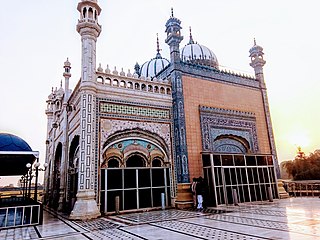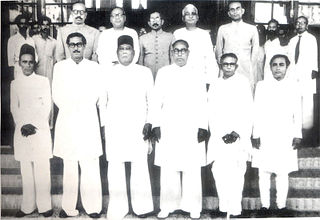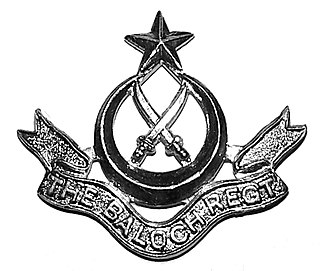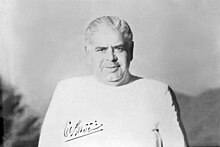
Bahawalpur was a princely state in subsidiary alliance with British Raj and later Dominion of Pakistan,that was a part of the Punjab States Agency. The state covered an area of 45,911 km2 (17,726 sq mi) and had a population of 1,341,209 in 1941. The capital of the state was the town of Bahawalpur.

Mian Manzoor Ahmad Wattoo is a Pakistani politician. Wattoo was first elected,in 1985,the Speaker of Provincial Assembly of the Punjab. Thrice elected to the same office,he secured the office of the Chief Minister of Punjab,Pakistan in 1993 on the ticket of Pakistan Muslim League (J),after a series of tug of war between the federal and provincial government Wattoo twice had to leave office between his term only to leave office permanently on 16 November 1996.

West Punjab was a province in the Dominion of Pakistan from 1947 to 1955. It was established from the western-half of British Punjab,following the independence of Pakistan. The province covered an area of 159,344 km sq,including much of the current Punjab province and the Islamabad Capital Territory,but excluding the former Princely state of Bahawalpur. Lahore,being the largest city and the cultural centre,served as the capital of the province. The province was composed of four divisions and was bordered by the state of Bahawalpur to the south-east,the province of Baluchistan to the south-west and Sind to the south,North-West Frontier Province to the north-west,and Azad Jammu and Kashmir to the north. It shared International border with Indian state of East Punjab to the east and Indian-administered Jammu &Kashmir to the north-east. It was dissolved and merged into West Pakistan upon creation of One Unit Scheme,in 1955.

Muzaffargarh is a city in the province of Punjab,Pakistan. Located on the bank of the Chenab River,it is the capital of the eponymous district. It is the 39th most populous city of Pakistan.

Rahim Yar Khan District,is a district in the province of Punjab,Pakistan. Its headquarters is the city of Rahim Yar Khan.
Akhter Husain,HPk,OBE,was a senior statesman and civil servant of Pakistan. He was appointed Governor of West Pakistan in September 1957 succeeding Mushtaq Ahmed Gurmani and then continued in this office during the regime of General Muhammad Ayub Khan until April 1960.

This is a list of notable events that took place in Pakistan in 1954.
The Sadiq Public School (SPS) is a college-preparatory boarding school located in Bahawalpur,Punjab,Pakistan. It also takes day pupils. It is one of the largest schools in Pakistan and its area of 451 acres (1.83 km2) makes it both the largest in the country and in continental Asia.

The Baloch Regiment is an infantry regiment of the Pakistan Army. The modern regiment was formed in May 1956 by the merger of 8th Punjab and Bahawalpur Regiments with the Baluch Regiment. Since then,further raisings have brought the strength of the Regiment to 27 battalions. The Baloch Regiment is descended from the infantry of the old British Indian Army and is named after Balochistan. Before 1991,it was called the Baluch Regiment but the spelling was changed to 'Baloch' to better reflect the correct pronunciation.

The Bahawalpur Regiment was a regiment of Pakistan Army. The regiment was formed in 1952 from the infantry battalions of the erstwhile Princely State of Bahawalpur,which had acceded to Pakistan in 1947. In 1956,the Bahawalpur Regiment was merged with the Pakistan Army
The Princely States of Pakistan were princely states of the British Indian Empire which acceded to the new Dominion of Pakistan between 1947 and 1948,following the partition of British India and its independence.
Abdus Salim Khan,also known as Khan Sahib was an Indian Civil Servant who later joined Pakistani Civil Service to become a diplomat. He served as an ambassador to several countries representing Pakistan.

Khan Ahmed Raza Khan known as Aghajan was a Pakistani civil servant,hockey player,tennis player,football player,first-class cricketer,and colour holder of the Punjab University cricket team.
Karachi Agreement is an agreement purportedly executed on 28 April 1949 between the Government of Pakistan and the then Government of Azad Kashmir governing the relations between Pakistan and Azad Kashmir. It set down the division of the powers between the two governments as well as the All Jammu and Kashmir Muslim Conference. Through the agreement,Azad Kashmir ceded to the Government of Pakistan complete control over Gilgit-Baltistan,and the control over subjects of defence,foreign affairs and communications in its area.
The 1955 Poonch revolt,also known as the 1955 Sudhan uprising was a Civil revolt in Azad Jammu and Kashmir against the State of Pakistan. The uprising broke out in February 1955 and was provoked largely by the dismissal of Sardar Ibrahim Khan. It took a year until the uprising was suppressed in October 1956.

The Ministry of Kashmir Affairs &Gilgit-Baltistan is a ministry of the Government of Pakistan. It handles the regional affairs of Azad Jammu and Kashmir and Gilgit-Baltistan as both territories of Pakistani-administered Kashmir do not have regular provincial status within Pakistan due to political circumstances revolving around the long-running Kashmir conflict.
The Politics of Muzaffargarh takes place at the municipal,provincial and federal levels of the government. ؐMuzaffargarh is a diverse city,home to multiple ethnicities,languages,cultures,and religions. The city is governed by one Municipal Corporation,six Municipal Committees,thirteen Town Committees,and five Tehsil Councils,as outlined in the Punjab Local Government Act of 2019. On the national stage,Muzaffargarh holds significant importance in both provincial and national politics.

The 1st Battalion,Sindh Regiment is an infantry battalion of the Sindh Regiment of the Pakistan Army.















